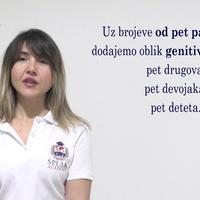Lesson 11.4 Serbian Language - Genitive
Lektion|Serbisch|Sprache|Genitiv
|||Genitive case
|||Genitivo
Lektion 11.4 Serbische Sprache – Genitiv
Lesson 11.4 Serbian Language - Genitive
レッスン11.4 セルビア語 - 属格
Lição 11.4 Língua Sérvia - Genitivo
Урок 11.4 Сербский язык – Родительный падеж
Ders 11.4 Sırp Dili - Genitive
课 11.4 塞尔维亚语 - 所有格
Genitiv
Genitive
Treći način da pokažete pripadnost jeste oblik genitiva
third|way||show|belonging||form|
U nekim jeyicima odnos mežu pojmovima označava se stavljanjem predloga ispred imenice, dok oblik ostaje nepromenjen
|some|certain||between|concepts|indicates||placing|preposition||||||unchanged
U srpskom jeziku i imenica menja oblik, može stajati sa predlogom ili bez predloga
||||||||verb to stand||preposition|||
Ovo su padeži u srpskom jeziku
||cases|||
Ima ih sedam
Nominativ
nominativo
Genitiv
Dativ
Dative case
Akuzativ
Accusative case
Vokativ
Vocative case
Instrumental
Instrumental
Lokativ
locative case
Nominativ je osnovni oblik imenice.
||basic|form|
The nominative is the basic form of a noun.
To je onaj oblik imenice koji stoji u rečniku, tako da ćemo ga preskočiti.
||||||stands||dictionary|||||skip
It is the form of the noun that appears in the dictionary, so we will skip it.
Jedan manje.
|one less
One less.
Podsetimo se gde smo sretali oblik genitiva.
let's recall||||met||genitive case
Let's remember where we encountered the genitive form.
Uz brojeve od dva do četiri, imali smo genitiv jednine: dva druga, dve devojke, dva deteta.
||||||we have|||||||two girls||two children
With the numbers from two to four, we had the genitive singular: two friends, two girls, two children.
Uz brojeve od pet pa nadalje, dodajemo oblik genitiva množine: pet drugova, pet devojaka, pet deteta.
With|||||onwards||form||||friends||||
With the numbers from five and onwards, we add the form of the genitive plural: five friends, five girls, five children.
Takođe, oblike genitiva imali smo uz predlog od: sestra od tetke, brat od strica.
|||||||||||||uncle
Also, we had forms of the genitive with the preposition from: sister from aunt, brother from uncle.
Nastavci za genitiv su sledeći:
The suffixes||||
The endings for the genitive are as follows:
Imenice ženskog roda koje se završavaju na suglasnik, u genitivu jednine i množine dobijaju nastavak –i: krv-krvi, reč-reči, kost-kosti, ljubav-ljubavi, pamet-pameti.
|||||||||||||||||of blood|||bone|bone's||love's|intellect mind|of mind
||||||||||||||||sangre|||||||||
Feminine nouns that end in a consonant, in genitive singular and plural, take the ending –i: blood-blood, word-word, bone-bones, love-love, mind-mind.
Imenice sr. roda oko i uho u genitivu množine glase: očiju i ušiju. Ovo su nepravilni oblici množine, odnosno, ostaci stare dvojine.
|of the sr||||ear|||||of the eyes||of ears|||irregular|forms||that is|remnants||dual
The neuter nouns eye and ear in the genitive plural are: of eyes and of ears. These are irregular plural forms, that is, remnants of the old dual.

